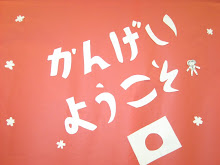Thursday: September 10, 2009 A Block Two Day
INDEPENDENT STUDY JAPANESE – Third period
Independent Study does not meet on Block One days.
JAPANESE 1 – Fifth period
Speed-writing of hiragana on special squared paper.
Projected on overhead: え
あお
おい
あい
いいえ
うえ
あおい
おおい
いう
ええ
ん
Checked workbook pages 14 and 15.
Quiz tomorrow on hiragana あ い う え お And ん
Written on board:
A は B が すき です。
A wa B ga suki desu.
B は A が すき じゃ ない です。
B wa B ga suki ja nai desu.
Arigatô Dô itashimashite
Kudasai Sumimasen
Handout on Japanese popular culture -- POI due tomorrow
JAPANESE 3 -- first period
Japanese 3 does not meet on Block 2 days.
Pranee Pairs spoke about her experiences this past summer in Wakayama City, Japan. Class then developed sentences in Japanese from the information she shared with us.
プラ二―さんのアドベンチャー
プラ二―さん は せいふく を きて いました。
わかやま の おてんき が つゆ でした。
おてんき が あつかった です。
じてんしゃ で こうこう に 行きました。
こと「琴」 を ひきました。
みせ の 中 に おもちゃ のねこ が ありました。
まち は わかやま し でした。
ホーストファミリー の お母さん は きれいな 人 でした。
そして やさしい 人 でした。
ホーストファミリー の おねえさん は 二十五さい です。
Going over yesterday’s handout – verbs in English and te forms – discussion-review of verb groups:
Group 1 “Strong” most numerous, extra i syllable before the masu, use song to figure out how make te form
Group 2 “Weak” easiest to conjugate: take off masu and then add te or other endings
Group 3 “Irregular” only two verbs, します Does, and きます Comes
Homework:
1. NY Times article about Election in Japan – POI
2. be prepared to speak of own summer story
3. requirements page – get it signed
4. quiz on designated verbs from yesterday’s handout:
あけます、あいます、あらいます、かきます、あるきます、よみます、のみます、はなします、さんぽ します、はじまります、まちます、あそびます、かいます、およぎます、かします
JAPANESE 2 -- Sixth period
See on video:New Song: Dango-san Kyoudai
The Three Dumpling Brothers
たべます Eats
のみます Drinks
よみます Reads
いきます Goes
たって
たちます Stands
きます Comes
ききます Hears, Listens to
みます見ます Sees, watches, looks at
すわります Sits
します(+) Does (+ sports and さんぽ、すいえい、かいもの、じょうば
あけます Opens
あけて
しめて
しめます Closes
かして
かします Lends
Exercises
でます Leaves
いそぎます Hurries
おくれます Is (will be) late
1. Quiz tomorrow on the above verbs.
Reminder: We all must be polite in the Japanese language classroom. Not only is it important in our lives in general – it is an essential part of Japanese culture. ください、おねがい します、ありがとう、すみません Are the most important words and phrases in Japanese.
JAPANESE 4 and AP – Seventh period
New song: だんご 3 兄弟 (きょうだい)Watched on Dailymotion.com. Sang first two verses together.
Speedwriting of known kanji -- 吐き出し Special format on squared paper.
Students handed in their POI’s of the NY Times article on the Japanese election.
AP students spoke several sentences each about the election in Japanese. Important vocabulary:
Election せんきょう
Liberal Democratic Party じみんとう
Prime Minister それだいじん (It’s Mr. Hatoyama)
All students worked on sections A and B of page 2 in Nakama 2, and then recorded information about themselves according to Section D of page 5.
Jpn 4 students then gave short self-introductions じこしょうかい。
Class proceeded to pages 6 and 7 of Nakama 2, working in pairs to practice exercise C on page 7.
なかま 2:Preliminary Chapter単語{たんご}Vocabulary
Sentence Structure:
Place の Position に Subject が います Or あります。
所 ところ Place
きょうしつ Classroom
たんす Dresser, armoire, etc.
時計 とけい Clock
かべ Wall
おいて Put
そば Nearby
隣 となり Beside
Test tomorrow on pages 6 and 7 of Nakama 2 。
About Me

- O.Kimeru
- M.A. 1992 from U. of Chicago; Japan Foundation Fellow in 1987-88; research fellow Yokohama City University; Japanese language teacher since 1991; also taught French (member American Association of Teachers of French), English as a Second Language (to students), methodology of teaching ESL (to Japanese high school teachers), English, Japanese history/culture, drama; in 2002 and 2004, listed in Who's Who Among America's Teachers; member of Chicago Sister Cities Osaka Committee, and chair of its Education Sub-Committee; vice-president Illinois Association of Teachers of Japanese; Payton H.S. World Language Department Chair from 2003-2007, under founding principal Mrs. Gail Ward; taught Japanese and coordinated Japan Exchange at Payton from 2003 to 2010; Japanese teacher at Burr Public School beginning August, 2010
Followers
Blog Archive
-
▼
2009
(146)
-
▼
September
(19)
- September 29, 2009 An Eight Period Day
- September 28, 2009 An Eight Period Day
- September 25, 2009 An Eight Period Day
- Japan Exchange Seminar 2009/09/24
- September 23, 2009 A Block Two Day
- September 22, 2009 A Block One Day
- September 21, 2009 An Eight Period Day
- September 18, 2009 An Eight Period Day
- September 17, 2009 An Eight Period Day
- September 16, 2009 A Block Two Day
- September 15, 2009 A Block One Day
- September 14, 2009 An Eight Period Day
- September 11, 2009 An Eight Period Day
- September 10, 2009 A Block Two day
- September 9, 2009, Wednesday
- September 8, 2009, an Eight Period Day
- Requirements for Kimmel Sensei's Japanese Classes,...
- requirements for Japanese classes, revised Septemb...
- Fall Haiku for the Beginning of School
-
▼
September
(19)